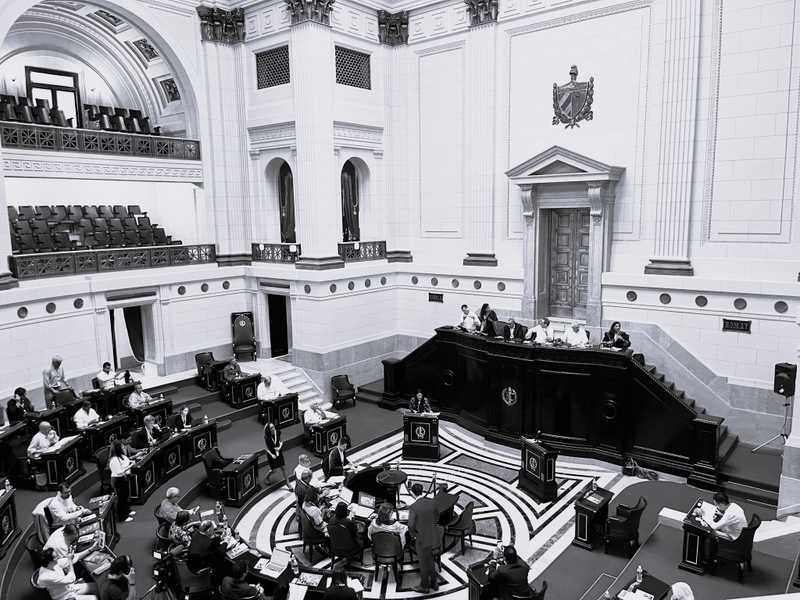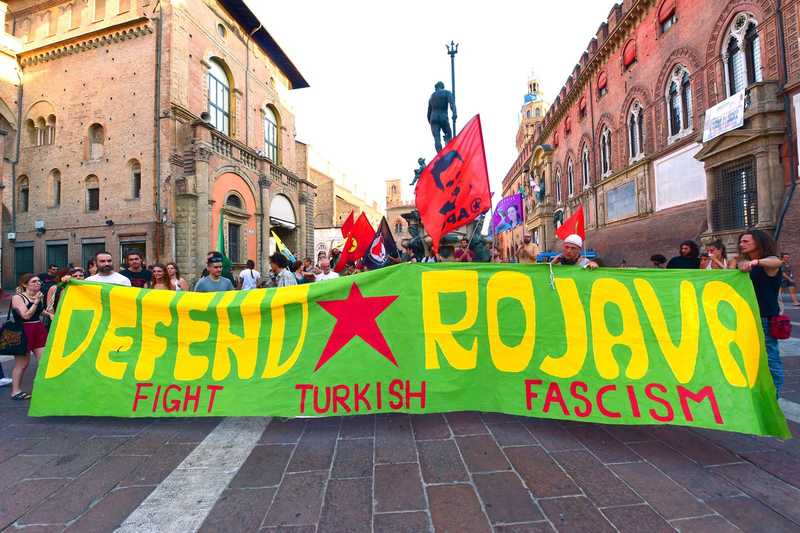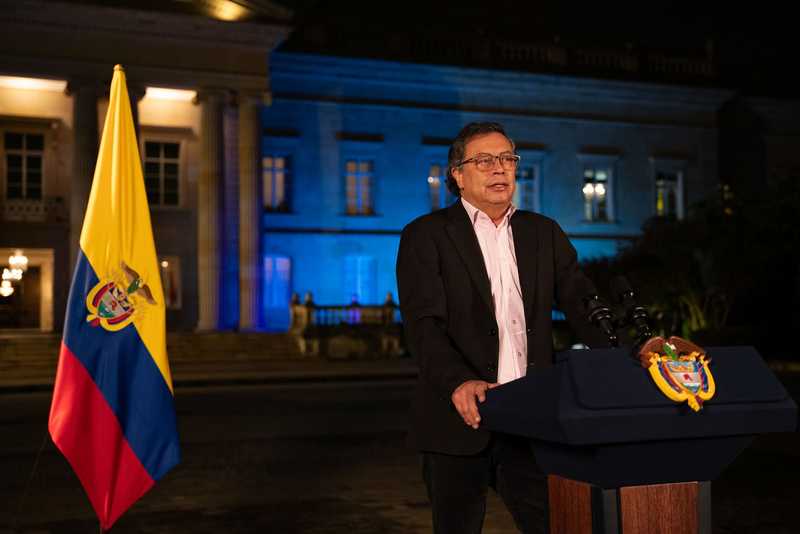
Today, we publish the Program of Action on the Construction of a New International Economic Order: a handbook for an insurgent South to win its sovereign and sustainable development in the twenty-first century.
The original Program of Action, adopted by the UN General Assembly five decades ago, provided a set of prescriptions to bring the global economy into greater balance and assist the poorest countries of the South — “seriously affected by economic crises and natural calamities” — to develop alongside their rich neighbors in the North.
Our motivation today is all the more urgent. “The old crises of debt, dependency, and under-development,” we write in the preface of the Program, “have combined with an accelerating crisis of climate to threaten not only the developmental prospects of the South — but also, in the case of many small island states, their very existence.
Over the past two years, the Progressive International has convened scholars, diplomats, and policymakers to develop a plan to address this polycrisis. Together, over 300 delegates from more than 60 countries across the world — collectively known as the “Havana Group,” for the annual NIEO Congress convened to the Cuban capital — have contributed to the development of the objectives and measures that comprise the Program of Action we publish today.
Download the Program of Action on the Construction of a New International Economic Order
Our commemoration of the NIEO is not an exercise in nostalgia. On the contrary, this two-year process began from the premise that we must learn from the failures of past efforts to establish a New International Economic Order: to renovate its Program of Action in such a way that maintains the audacity of its vision, but refines the tactics to realize it.
The original NIEO set out a series of “urgent and effective measures to be taken by the international community to assist the developing countries.” Five decades later, though, we can see that this “international community” — in particular, the rich countries of the North that claim to lead it — are not only unwilling to provide such assistance; they are also determined to sustain the under-development of their Southern neighbors in order to protect their relative privileges.
One statistic will suffice to illustrate the present state of North-South relations. Today, the countries of the South pay billions more to service their debts to the North than the North provides in development assistance to the South. In other words: Centuries on from the birth of the colonial system, the world’s resources — natural, financial, human — continue to flow from its poor countries to its rich ones: a plunder that sustains the Brandt Line between North and South.

To win a New International Economic Order, then, it is not enough to petition the North with a set of reasonable demands. No amount of good sense can prevail over entrenched interests; no number of great ideas can coax benevolence from the chief beneficiaries of the existing international order. As the Havana Declaration set out at the NIEO Congress in 2023: “Economic liberation will not be granted; it must be seized.”
That is why the Program of Action we publish today no longer refers to the “Establishment” of a New International Economic Order, but rather its “Construction.” The measures set out across its five major sections offer concrete proposals that the South can take immediately, collectively, and unilaterally to reconstruct the global economy in the service of peace, justice, and prosperity.
To defend their sovereign development against the overwhelming power of multinational corporations, Southern nations might coordinate their withdrawal from the Investor-State Dispute Settlement (ISDS) system. To ensure that its natural wealth benefits its peoples, Southern nations might form resource export clubs to coordinate the terms and conditions of production. And to dismantle corporate monopolies on human knowledge, Southern nations might build new coordinating institutions toward the development of critical technologies for health, food, and climate action.
In all, the Program of Action offers nearly three dozen measures across its five broad sections — to leverage the South’s natural wealth, labor power, and collective voice in order to extract concessions from Northern partners; to bolster the sovereign development agenda by building Southern alternatives to Northern institutions; and to pool Southern knowledge, resources, and ingenuity in service of a whole that is greater than the sum of its parts.
The reasons for the original NIEO’s failure are well known. Outside the Southern bloc, the NIEO confronted fierce resistance from the dominant powers of the North. Within the Southern bloc, divisions of ideology, geography, and resource endowments splintered the NIEO’s founding coalition. And inside the individual nations of the Southern bloc, crises of domestic political economy distracted from ambitions toward the international one.
In the five decades since, the challenges to the New International Economic Order have intensified across these three dimensions. The interests of the North have consolidated. The coalitions of the South have corroded. And the domestic conditions of their individual nations — social, economic, and political — have deteriorated. The prospect of reconstructing the international economic order, in this context, is more than daunting. It may appear impossible.
The Program of Action that we publish today aims to triumph over this paralysis, and the fatalism that flows from it. Its measures have been crafted specifically for the challenging conditions that prevail today across the South: to take advantage of temporary opportunities, to start small with the possibility to scale, to initiate the construction of new institutions that will deliver dividends to sustain their development over time. If the strategy remains to “bring about maximum economic co-operation and understanding among all States,” then these are the tactics to achieve it.
This tactical approach is already finding traction in diverse corners of the South. From Indonesia to Mexico, critical mineral exporters are calling for the formation of united export clubs. From Honduras to South Africa, momentum is growing to ditch the corporate arbitration system and the ICSID treaty that sustains it. And just this year, Colombia announced its decision to bypass patent restrictions in order to provide HIV medicine to its people at a stable, fair price.
Our task is to build from these efforts toward a wider set of interventions — to coordinate across borders, to catalyze new and creative modes of resistance, and to synchronize one-off measures into a global project of insubordination.
The Program of Action that we publish today is a living document. It is neither comprehensive in its approach to the combined crises that menace the South, nor is it complete in its offering of measures to redress them. Over the course of coming months — from Brasilia to Beijing — the Progressive International will continue to develop this program both to refine its existing measures and to introduce new ones to its roster.
But the process of implementation cannot wait. From today, we turn toward the ambitions set out by the Havana Group in the conclusion of the Program of Action, which calls to:
“Take the Program Home, transporting its proposals to all nations, and planting their seed in every community we call home;
Bring the Program to Life, sustaining the coalition forged in the NIEO 1974-2024 process to implement the coordinated actions that are the precondition to the construction of a new international economic order;
Build the Broader Bloc, calling on all nations and peoples to join that coalition and fulfill its shared vision of peace and prosperity;
Break the Brandt Line, advancing in unity toward the horizon of true economic liberation, where the domination of the North finally gives way to the dream of peaceful, prosperous coexistence between all peoples.”





